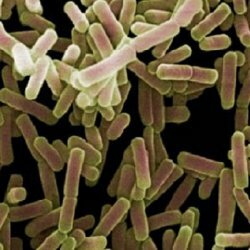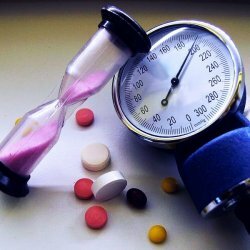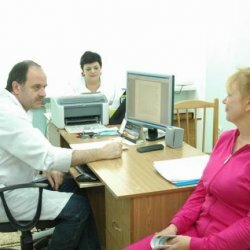The influence of microbes on human health
 Microbes that live in the human body can even be friends. The harmony of the body's relations, as well as normal microflora, can be disturbed by the pressure of various unfavorable factors. The causes of the disorder are, for example, the ailments of the gastrointestinal tract, as well as acute infections, and especially intestinal infections - typhoid fever, dysentery and others. The causative agents of these diseases always cause inflammation of the intestinal mucosa, they promote the reproduction of a conditionally pathogenic microflora that displaces the main inhabitants of the intestine.
Microbes that live in the human body can even be friends. The harmony of the body's relations, as well as normal microflora, can be disturbed by the pressure of various unfavorable factors. The causes of the disorder are, for example, the ailments of the gastrointestinal tract, as well as acute infections, and especially intestinal infections - typhoid fever, dysentery and others. The causative agents of these diseases always cause inflammation of the intestinal mucosa, they promote the reproduction of a conditionally pathogenic microflora that displaces the main inhabitants of the intestine.
The effect of microbes on the health of
The species composition, distribution, as well as the number of microorganisms entering the intestinal tract, largely depend on the nature of the diet. For example, some of them with food and drink cease to receive the necessary nutrients, and their colonies are sharply reduced. Others, on the contrary, receiving increased nutrition, rapidly multiply and colonize new areas of the intestine. And this leads to the emergence of food dysbacteriosis, which is characterized by a violation of the work of our intestines. Food dysbacteriosis is sometimes observed in infants, when they are transferred from a breast to a mixed diet. However, if the lure is correct, then these phenomena quickly pass, digestion is normalized.
Uniform food can also lead to food dysbacteriosis, for example, enthusiasm for modern diets, when all foods are completely excluded from the diet. And it is no accident that sometimes the strictest medical diets doctor appoints only during the period of exacerbation of the disease.
Nothing activates so opportunistic microflora as improper intake of antibiotics. It would seem that antibiotics are a formidable and effective weapon against harmful microorganisms. But many of these drugs are harmful not only to microorganisms pathogenic, but also to beneficial microflora.
While useful species of bacteria are suppressed by antibiotics, many varieties of enteropathogenic E. coli are rapidly beginning to multiply, become aggressive enemies - they begin to produce toxic substances, and also destroy red blood cells( these are red blood cells).Also, many other representatives of useful microflora lose their properties, are displaced from the intestines by multiplying antibiotic-resistant microbes, they are already fully able to perform their functions. They lose the ability to regulate and control the growth of opportunistic microbes, this leads to the activation of Pseudomonas aeruginosa, staphylococcus, vulgar proteus, pathogenic fungi of the Candida species and others. Developed in this case, dysbacteriosis is much harder than food. Almost completely defenseless becomes the intestinal mucosa before conditionally pathogenic, as well as pathogenic microbes. Because of this, acute intestinal infections are often attached to the dysbacteriosis, which take a long, chronic character. That's why experts do not get tired of reminding us of what kind of disaster for the body can result in self-medication by such powerful means as antibiotics.
Some people may have a question: are such violations of the equilibrium of the intestinal microflora excluded when a person takes antibiotics on the recommendation of a doctor? Doctors try to minimize this possibility. They conduct a rational antibiotic therapy, an important principle of which is the preservation of useful intestinal microflora. Methods of rational antibiotic therapy are worked out in the clinic and experiments, the effect of a drug on various representatives of microflora is carefully studied and combinations of antibiotics are chosen so as to reduce, neutralize the side effect of them. At the present time, selective decontamination is becoming increasingly widespread in clinical practice. This method of drug therapy is based mainly on the selective destruction of opportunistic microflora, as well as on the almost complete preservation of beneficial microorganisms.
There are situations when you do not have to choose, you need to sacrifice some to save the whole. A part is a useful microflora, the whole is an organism. For example, when a person's life threatens danger, and so happens in sepsis - a microbial infection of the blood or a serious infectious disease, usually resort to huge doses of broad-spectrum antibiotics. These measures are justified, otherwise it will simply not be possible to overcome a serious illness - to save a person. However, once the danger has passed, doctors take measures to restore the normal microflora of the intestine, to re-occupy it with useful microorganisms.
In our country, biological effective preparations are made from living bacteria that are part of normal microflora. For example, bifidumbacterin, bifikol, colibacterin and others, through which the normalization of the microbial flora can be achieved. Treatment is appointed depending on the results of the study( bacteriological), which allows to determine the "microbial climate".
In our time, very close attention has been paid to improving the methods of diagnosing dysbacteriosis. More recently, a group of specialists from the Institute of Microbiology and Epidemiology has developed an original method that makes it possible to determine the disappearance of a useful microflora that prevents the propagation of opportunistic microbes. Specialists, focusing on the severity of dysbiosis, determine the exact doses of biological preparations, as well as the duration of their use.
It should be noted that dysbiosis - ailment is very persistent, requiring a long and purposeful treatment. Restoring between microbes a normal ratio is half the battle, it is still necessary to exert much effort to maintain and support it. First of all, you should make sure that the food is varied. Necessarily in the diet should be lactic acid foods - kefir, acidophilus, yogurt, and others. Lactic acid bacteria contained in such products are antagonists of putrefactive, as well as conditionally pathogenic microflora.
To admit constipation is not necessary: a delay in the intestines of food leads to the fact that in the body begin to dominate the processes of decay and suffers from this normal microflora. Also, products of putrefaction that are not excreted in time from the body can be absorbed into the blood, poisoning the body. The regularity of emptying is especially important for elderly people, because they often have constipation.
I want to emphasize that the normal state of the intestinal microflora depends on many factors, as well as on how competently we treat the recommendations of a specialist about taking any medications, how our meals and the whole way of life are organized. It is worth remembering that a normal microflora always needs support.



